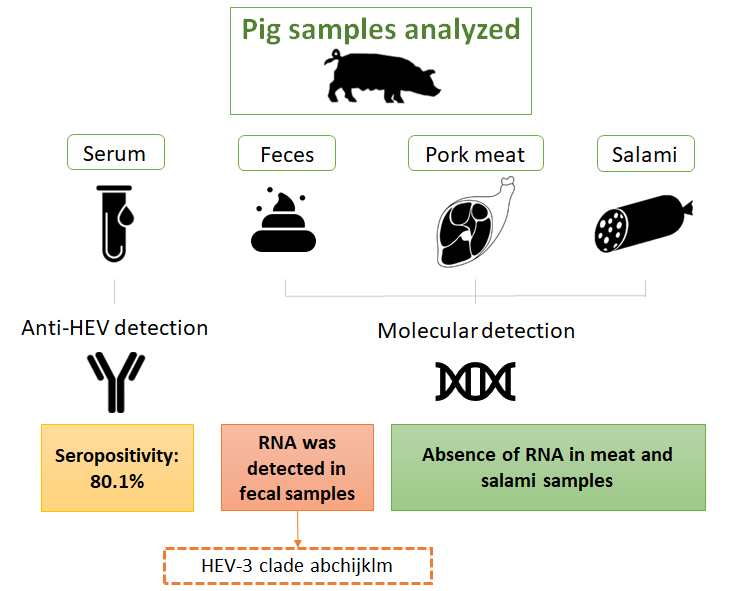Hepatitis E virus (HEV) is an emerging cause of viral hepatitis and several animals such as pigs, wild boars or deers, are considered a reservoir for the virus. HEV genotype 3 (HEV-3) has been reported in pigs, wild boars, environmental matrices, and sporadic human cases in Argentina. HEV infection in pigs is typically asymptomatic and animals usually get infected at 8-12 weeks old when maternal antibodies decrease, with a short-lived viremia after exposure followed by a more extended period of viral shedding in the feces, which may vary in duration. Since HEV replicates in the liver and can spread to other tissues, consuming raw or undercooked pork products from infected animals, like sausages and liver, can increase the risk of HEV transmission to humans.
A recent study led by Dr. Guadalupe Di Cola and Dr. María Belen Pisano aimed to investigate HEV circulation in pigs from central Argentina and to assess the virus presence in pork meat and food products. For this propose, four types of samples obtained or derived from pigs collected in Córdoba province (Argentina) between 2019 and 2022, were tested: serum samples were analyzed for anti-HEV antibody detection (HEV Ab Ultra, Diapro); stool, pork meat, and salami samples were screened for RNA-HEV detection (real time RT-PCR). Positive samples for molecular detection were then amplified (nested-PCR ORF1 and ORF2), sequenced (Sanger) and subjected to phylogenetic analyses (MEGA v11, IQ-TREE, FigTree softwares).
The detection frequency of total anti-HEV antibodies in serum samples was 80.1%. RNA-HEV was detected in 11 samples of feces, belonging to young animals (<120 days of age); 3 of them could be further amplified and sequenced. Phylogenetic analyses showed grouping within HEV-3 clade abchijklm, closely related to strains previously identified in wastewaters from Córdoba, Argentina. On the other hand, none of the muscle meat or salami samples tested positive.
This study revealed a high seroprevalence of HEV in pigs, with widespread viral circulation observed in pig breeding centers throughout the province. These findings highlight the potential role of these animals in maintaining the virus in the region. However, our data contribute to the hypotheses that foods derived from raw pork would not be the main source of HEV infection in Córdoba region, particularly from animals entering the commercial production chain. Further research is needed to understand better the role of foodstuff derived from raw pork in human infections.
Read the full article (Res Vet Sci. 2023 Sep 4:164:105000): DOI: 10.1016/j.rvsc.2023.105000

